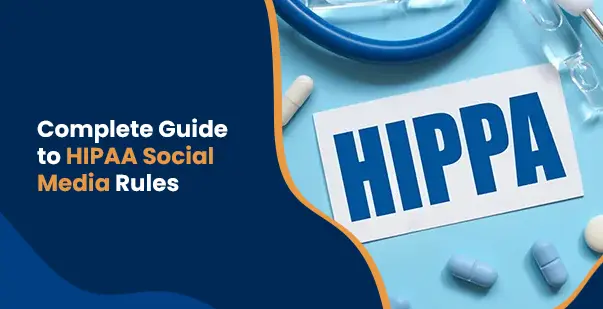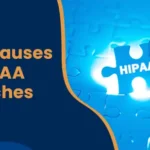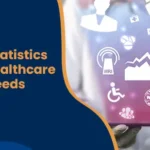Complete Guide to HIPAA Social Media Rules

August 11, 2025
Introduction
Social media platforms have become a channel for healthcare providers to connect with their target audiences. Currently, 80% of internet users are on social media to search for doctors, healthcare services, medical information, and health-related news. Today, it has become important for health sector employees and associates to protect the data of all the stakeholders by following HIPAA social media guidelines.
The Health Insurance Portability and Accountability Act (HIPAA) ensures the responsible storage and sharing of health data on public forums and social media platforms. This law was passed in 1996, way before social media, to manage Protected Health Information (PHI) and prevent misuse of patients’ confidential data.
This in-depth article will help you learn everything about HIPAA social media rules, with best practices to create a safe online community.
The Integration of HIPAA with Social Media
The use of social media by healthcare providers has become a common practice for patient engagement, education, and brand building. Lack of awareness among workers often puts patients at risk of data misuse and identity theft. This is where HIPAA comes in to help providers share data. The act is structured around key patients’ privacy, security, and data breach notification:
Privacy Rule
HIPAA’s social media privacy rule ensures that sensitive data related to patients’ identity and medical history remains protected. The Act provides guidelines and rules to restrict the use and sharing of sensitive health information. With privacy rules, healthcare workers can identify the possible risks related to patients’ health data leakage.
Security Rule
It establishes standards for electronic health information (ePHI) to ensure the safety of patients’ identities online. The security rule keeps the data secure to p[prevent its leakage. It ensures the patients are safe even years after their treatments.
Breach Notification Rule
The breach notification rule requires covered entities to inform individuals if their health information is compromised. It presents guidelines to alert the parties involved. It enables the HIPAA Act and regulatory bodies to take necessary precautionary steps before the situation gets worse.
Possible Risks of Negligent Social Media Usage For HIPAA
Posting authentic, engaging, and informational content is beneficial for both healthcare businesses and their target audiences. However, careless posting of data brings unique challenges when it comes to HIPAA social media rules. The possible risks include:
Unauthorized Disclosure of PHI
Posts containing sensitive details about patients and their medical histories are at risk of misuse. This data leak might seem harmless, but it can lead to violations. Healthcare workers must take extra care while posting their work-related content online.
Unintentional Breaches
Employees may unintentionally share PHI through comments, likes, or shares. Even while posting regular content on their private socials, they should be aware of their work surroundings. Healthcare workers must pay attention to the details they choose to upload on the internet to prevent such data breaches.
Misunderstanding Patient Consent
Even if patients agree to share their stories, reviews, or testimonials, providers must ensure that no identifiable information is revealed without clear permission. Get written consent and avoid exposing their real identity on the internet. Provide clear details of terms and posting policies to let the patients know their exposure to possible risks.
Misinterpretation or Misrepresentation of Information
Social media content is not limited to images and videos. It includes blogs and captions to help the audience understand the context better. However, misinterpreting the tone and narrative of the content may lead to ambiguity in patient care methods or advice provided by healthcare specialists.
Best Practices Under HIPAA Social Media Rules
The main goal of HIPAA social media rules is to protect patient privacy. Healthcare providers, insurance companies, and anyone who maintains patient information must be mindful of what they share online. The following best practices ensure responsible use of social media and compliance with HIPAA regulations:
-
Understanding PHI Data
To follow HIPAA and social media rules, health sector workers must understand the types of data included in PHI. The common constituents of PHI are sensitive information like name, address, contact, medical history, social security number, and medications, among others, that may lead to the identification of the concerned patient. Before posting any content related to the hospital or medical help, one must be mindful of the PHI data covered under HIPAA guidelines.
-
Perform Risk Assessment
This is an important step to ensure that the provider’s social media content does not reveal identifying details of the patients. Businesses can make strict social media policies regarding the use of work-related content by employees for their private accounts to ensure they do not violate HIPAA laws. This will help them identify future threats and devise procedures to eliminate them for a safer online presence.
-
Use Secure Platforms
Several social media platforms and channels allow users to share information and opinions with the world. However, not all of them are safe, and with the integration of Artificial Intelligence (AI) in many platforms, it is even more important to carefully review platform user agreements. Healthcare providers and their employees must ensure they use only trusted distribution channels to protect the privacy of their patients.
-
Content Strategy
Having a foolproof content strategy will help businesses comply with HIPAA social media laws. They can form a dedicated social media team to run safe social media campaigns and keep track of unwanted breaches of patients’ data while interacting with the online audience. Hiring an experienced social media manager will make the online visibility impressive without violating HIPAA rules.
-
Monitor And Audit Social Media Activities
Healthcare organizations must also regularly survey and audit their social media handles to catch potential breaches and risks while engaging with users. They should avoid mentioning patients’ medical history and case studies without proper written consent. They should also address negative comments and feedback responsibly by helping the complainant with correct and authorized information under HIPAA rules.
Conducting regular social media audits for your healthcare business will help you identify current trends in the medical niche and audience interaction with the content. This will help you modify the current content strategy according to future trends and customer demands.
-
Consult Legal Counsel
Regular consultations with legal experts in the healthcare domain can help navigate ambiguous situations related to HIPAA and social media rules. This will ensure the content strategy is up-to-date with current legislative changes, if any. Getting approval from law personnel will prevent any future violations, making the social media content safe to share.
-
Employee Training
Effective compliance with HIPAA and social media rules requires healthcare organizations and business owners to educate their employees on the legal aspects of HIPAA mandates. Several HIPAA courses are available for health sector employers to train their workforce and make them more responsible. This will ensure their employees are updated about the PHI privacy rules and boost the confidence of their customers at the same time.
Read more: What is Considered Protected Health Information Under HIPAA?
Who Must Comply with HIPAA and Social Media Rules?
While HIPAA social media rules primarily target healthcare providers, they also extend to any entity that handles protected health information (PHI). These include:
- Healthcare professionals (doctors, nurses, therapists, etc.)
- Health plans (insurance providers)
- Healthcare clearinghouses (involved with nonstandard health information)
- Business associates (health sector third-party service providers who have access to PHI used by covered entities)
- Healthcare Researchers (scientists/students/research fellows working with health-specific case studies)
People working and handling sensitive medical care information of patients daily come under the umbrellarm of ‘covered entities’ in the HIPAA Act. These professionals and business management must ensure the careful use of social media when posting about their work activities online.
How To Create a HIPAA Social Media Policy?
If you are a covered entity, setting a strong HIPAA social media policy will help you maintain a safer online presence. This can be a document with well-defined rules that explain to all the employees how to use social media without leaking any PHI data. Here’s what a good HIPAA social media policy should include:
- An easy-to-understand explanation of HIPAA rules and why they matter for social media.
- Clear examples and guidelines of what can and can’t be shared on private and public social media accounts.
- Workplace rules about social media usage on-site or during working hours.
- Information about the consequences and potential damages of breaking HIPAA Social Media rules.
- A procedure to get content approval before uploading anything work-related on social media platforms.
- Guidelines regarding handling patient complaints and inquiries online to ensure PHI is not disclosed under any circumstances.
- Strict rules and punitive actions in case of negligent handling of medical data by the employee.
The Consequences of Breaking HIPAA Social Media Rules
Breaking HIPAA social media rules may seem like a small mistake, but have serious consequences. A single leak of confidential patient data on public forums can be life-threatening, which can cause severe anxiety to the victim. In addition to causing unwarranted stress to the patients, it may cause other negative outcomes, such as:
Fines and Penalties
The Office of Civil Rights (OCR) of the US Department of Health and Human Services (HHS) regulates HIPAA breaches and imposes penalties. Fines as high as $50,000 per violation can result. Depending on the nature of the threat, volume, and sensitivity of PHI data, one may even face imprisonment for one year.
Job Loss
Many healthcare employees have lost their jobs for sharing patient information on social media. HIPAA violations by a worker show their careless attitude and neglect towards patients’ privacy. This further tarnishes their work ethic, decreasing their chances for future employability.
Legal Trouble
In some cases, breaking HIPAA social media rules may lead to lawsuits or criminal charges. Leakage of sensitive PHI can result in identity theft, financial scams, or fraud. This may land the offender in serious legal trouble and they might have to pay a heavy sum as a fine to the victim.
Damage to Reputation
Both victims and healthcare organizations can suffer damage to their reputations if they violate patient privacy. Social media can make or break your online reputation. Even a small mistake in handling confidential data can make you lose your loyal audience, making it difficult for customers to trust your healthcare services again.
Read more: The HIPAA Minimum Necessary Rule Standard
Protect Patients’ Privacy on Social Media
Social media is a boon for healthcare businesses to grow organically and internet users to seek answers to health-related inquiries and grievances. Thus, understanding HIPAA social media rules and implementing best practices can help healthcare organizations ensure data privacy on public distribution channels. This will help them create engaging content, share medical information, and reach their target audience without compromising patient confidentiality.
Sensible social media use with an awareness of HIPAA regulations is a constant work in progress. Organizations must create a strong social media policy, train employees, and monitor online interactions to ensure a safe online community.





